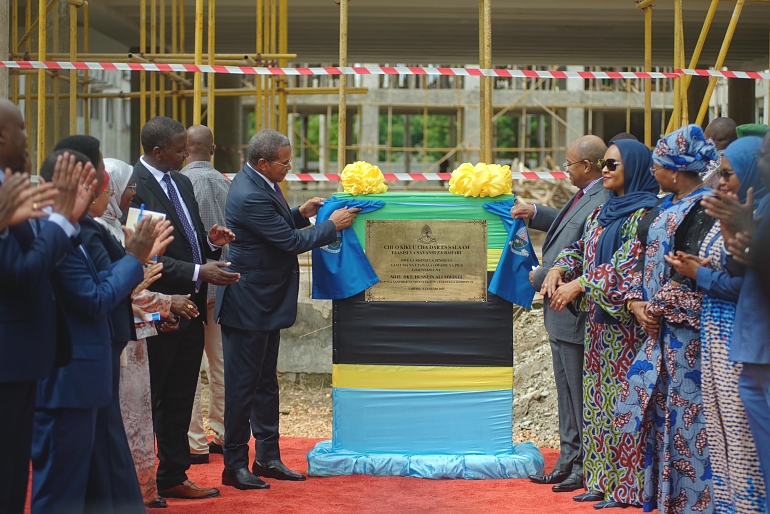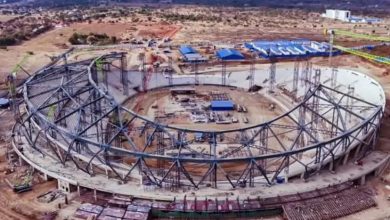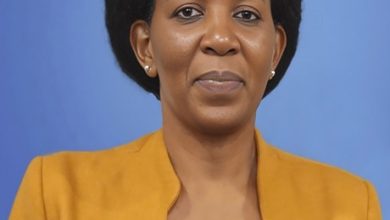Mwinyi accentuates blue economy agenda

ZANZIBAR: ZANZIBAR President Dr Hussein Mwinyi has said that the Institute of Marine Sciences (IMS) of the University of Dar es Salaam plays a vital role in advancing the blue economy agenda, which focuses on the sustainable use of marine resources.
Dr Mwinyi made this statement after laying the foundation stone for the construction of the IMS Academic and Administration Building at Buyu, Chukwani in Unguja West B District.
The event was part of the activities marking the 61st anniversary of the Zanzibar Revolution of 1964.
He noted that Zanzibar’s core economic policy centres around the blue economy, which includes sectors such as tourism (which contributes 30 per cent to GDP), fishing, seaweed farming and marine aquaculture.
“IMS is well-positioned to produce experts in these fields, as well as in other sectors of the blue economy, including seaports, oil and gas and maritime transport,” Dr Mwinyi said.
President Mwinyi further said that the government has high expectations for the institute in generating research that will contribute to the development of the blue economy.
“Our core policy is the blue economy. We are working to develop policies based on research findings, and we believe the knowledge generated here will help shape policies that drive progress in this sector,” he said.
Dr Mwinyi expressed satisfaction with the progress of the IMS Administration Building construction and hoped the project would be completed as scheduled.
He also pledged continued government support for the institute to ensure the goal of producing blue economy experts is achieved. The event also provided an opportunity for Dr Mwinyi to recognise the contribution of the World Bank to Tanzania’s development.
“We appreciate their continued involvement in implementing projects across the country, which reflects the commitment of both our governments to managing public and donor funds effectively,” he said.
The president also encouraged local and foreign investors to consider the Buyu coastal area for investment.
He said, “Once the modern construction is completed, this area will offer attractive opportunities for investment in sectors like housing, hotels, conference facilities, transportation, healthcare and marine science research.”
Reflecting on the 1964 Revolution, Dr Mwinyi acknowledged Zanzibar’s significant developmental strides, particularly in the education sector.
ALSO READ: Tanzania revels on rural electrification success
The Chancellor of the University of Dar es Salaam and former President of Tanzania, Dr Jakaya Kikwete, commended President Samia Suluhu Hassan for including IMS in the Higher Education for Economic Transformation (HEET) project, which has been instrumental in advancing the institute.
Dr Kikwete also praised Dr Mwinyi for securing the land title deed for the IMS, a critical step for the project’s funding, as per World Bank construction requirements.
“This achievement was not possible without Dr Mwinyi’s leadership and vision,” Dr Kikwete said, noting that similar conditions applied to other education projects across the country, including those in Lindi and Bukoba.
Dr Kikwete commended Zanzibar’s progress and urged Dr Mwinyi to remain dedicated to further advancing the region’s development.
Providing an overview of the IMS development project, UDSM Vice-Chancellor Professor William Anangisye, said that the project aims to produce knowledge that strengthens academic, economic, social and technological fields both locally and internationally.
The project is funded by the World Bank through the Ministry of Science and Technology, in collaboration with Zanzibar’s State University (SUZA).
“The main goal is to enhance learning environments, align curricula with labour market demands and strengthen the higher education system in Tanzania,” said Prof Anangisye, who revealed that the Zanzibar Revolutionary Government allocated 50.24 hectares in Buyu for the institute in 2003.
The construction contract, signed on February 22, 2024, is valued at 11.1bn/- and is expected to be completed within 18 months. The project is currently 50 per cent complete and will feature five laboratories, classrooms and lecture rooms to accommodate approximately 300 students.
It will also include a conference hall for around 150 people and staff offices. Upon completion, the project is expected to increase the student population, enhance internship opportunities, attract visiting academics, improve teaching quality and boost job market readiness.
Prof Anangisye praised Dr Mwinyi’s leadership, noting the significant progress in economic growth, infrastructure development, revenue collection and public expenditure management.
On his part, Minister for Education, Science and Technology, Professor Adolf Mkenda, reflected on the pivotal role of the 1964 Revolution in advancing education reforms and commended Dr Mwinyi’s efforts to further strengthen the education sector.
Zanzibar’s Minister for Education and Vocational Training, Ms Lela Muhamed Mussa, underlined the government’s investment in the blue economy.
She said that Zanzibar aims to tailor its education curricula from primary to secondary levels to prepare students for enrolment in the IMS and equip them with the necessary skills and expertise to serve in specialised marinerelated fields.
Zanzibar’s Minister for Blue Economy and Fisheries, Mr Shaaban Ali Othman, underlined the significance of the institute, noting that the blue economy’s priorities include fishing, seaweed farming and marine products.
He insisted the importance of human resources, research, technology and expertise, which the institute will provide, affirming his ministry’s full cooperation with IMS.





